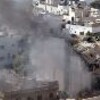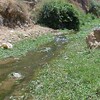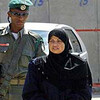
Weekly report on human rights violations
14 August 2003
This week, Israeli forces killed four Palestinians in ‘Askar refugee camp in Nablus. During a wide-scale Israeli military invasion of Hebron, Israeli forces killed a Palestinian activist. Israeli forces continued to shell Palestinian residential areas. Israeli forces demolished a home in ‘Askar refugee camp as Israel continues its campaign of collective punishment and reprisal. Israeli forces continued to use Palestinian civilians as human shields in military operations and deny access of Palestinian farmers to their agricultural lands. Meanwhile Israeli forces razed more land and continued its tight siege on Palestinian communities in the West Bank and Gaza Strip. Read more about Weekly report on human rights violations



